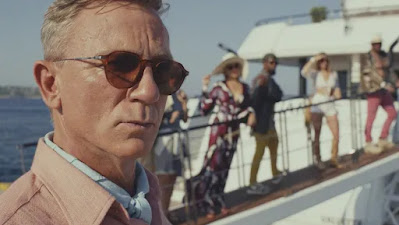Glass Onion isn’t exactly a sequel to Knives Out. It’s simply another complicated case for its sole returning character to puzzle through. Good thing detective Benoit Blanc (Daniel Craig) is such great company, oozing Southern charm and confidence, while behaving an enlightened, affable gentleman who can slip right into any social context. He somehow stands out and blends in, the better to be underestimated as he gathers clues. And good thing, too, that writer-director Rian Johnson knows a thing or two about constructing a sequel that zigs when you’d expect it to zag, and ends up satisfying even more for giving you what you didn’t know you’d like to see. This one is a larger film, trading the first’s bickering family clad in cute sweaters, holed up in a cozy New England house while all their grievances tumble out, for a palatial mansion, with enormous sunny sets on a private Greek island filled with rich friends hanging around in sunglasses and beachwear. If Knives Out had an autumnal Thanksgiving vibe, Glass Onion is pure summer vacation.
It finds Blanc invited to a murder mystery party. He’s the ringer, and stranger, in a group of obscenely wealthy friends—a satirical send-up of every contemporary societal ill. There’s the host: an out-of-touch, and out-of-his-mind, tech bazillionaire (Edward Norton). And there are the guests: a hypocritical politician (Kathryn Hahn), a private-sector scientist-for-hire (Leslie Odom, Jr.), an alt-right YouTuber (Dave Bautista) and his girlfriend (Madelyn Cline), a ditzy model-turned-mogul (Kate Hudson) and her assistant (Jessica Henwick), and a former business partner who may be out for revenge (Janelle Monáe). It’s pretty easy to believe one of them will actually be murdered, and that they’ll all be so greedy and stupid that it might give Blanc quite a challenge. Johnson gives us a long, glittery, rambling opening hour that provides introductions to all of the characters and their dynamics. Invitations are delivered. The group assembles in Greece for the boat ride to the island. (Set during the first COVID summer, the way they wear their masks upon arrival is a big clue about their personalities.) They settle in for their first night in the mansion—a massive high-tech structure with dozens of rooms and topped with a gargantuan glass onion. The camera often pulls back to sweep around in bright establishing shots and drink it in, the sets and the setting providing a gleaming backdrop for the scheming. And throughout, Johnson, by taking his time, makes these political cartoons into bantering people we can size up and keep in mind as believable variables at play as the plot unfolds.
By the time the screenplay springs its surprises, doubling back on itself and deliberately filling in gaps I hadn’t paused to realize were left open, the film reveals it is awfully clever in a way that never stops paying out. There’s plenty of enjoyment on the surface of the movie, but when the setup reveals its full intentionality, there’s an added layer of rewards for the attentive viewer. This is a charmer of a mystery that you could practically chart on graph paper as its various setups converge with supremely satisfying reveals and conclusions. There’s an airtight clockwork construction at play, with each gear of plotting and character and humor turning at just the right time to click into place for crowd-pleasing punchlines and payoffs. Johnson’s a filmmaker with a great sense of genre play. See his straight-faced high-school noir Brick, or pretzel-logic time-travel thriller Looper, or his vivid, moving Star Wars episode. Here he’s totally at home, and clearly having fun, constructing these crafty mystery plots. They twist and turn, dangle detours and dole out tricks of perspective, but they always play fair with the audience. You can keep up with the logic, and by the end see the details close in with a pleasing snap. (It’s the dialogue and editing that does all the crackling and popping.) There’s evident delight in the construction, and that extends to the ensemble’s winning commitment to throwing themselves into the proceedings with wit and verve, too.
This has been a busy year for the whodunit movie. We got Greg Mottola’s shaggy, appealing Confess, Fletch. There was Kenneth Branagh’s opulent, excessive, and over-acted adaptation of Agatha Christie’s Death on the Nile; that has its velvety 70mm melodrama pleasures. We got a quaint and cozy little jewel box of a Christie homage, See How They Run; that’s a cute, winking meta-movie about a fictionalized murder mystery around the stage production of Christie’s The Mousetrap. (That movie actually brings Christie onstage, as if to say it was Agatha All Along.) But Glass Onion is head-and-shoulders above the rest. Rather than falling into homage or dutiful resuscitation of old tales, it’s the real deal itself. It’s built for maximum audience pleasure, and is quite pleased with itself, too. It’s formula without being formulaic. We return to these stories, not to be shocked and appalled or grossed out, but to take the mental exercise. Maybe it’s the cozy comfort of knowing, though the film may start with a dead body, it’ll end with a murderer revealed, and something like justice doled out.












